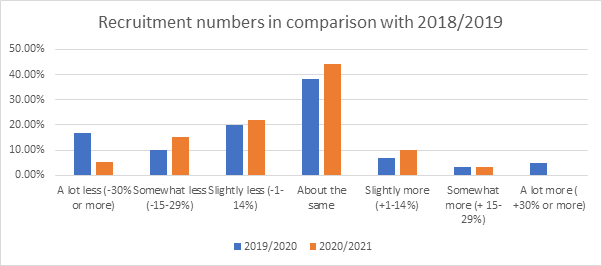ISE’s Tristram Hooley, reports on how employers are responding to the Chancellor’s Plan for Jobs. He argues that there are serious concerns about how employers are responding to the Plan.
It has now been almost two months since the Chancellor announced his Plan for Jobs. In the launch speech he set out its purpose as follows:
‘Our plan has a clear goal: to protect, support and create jobs. It will give businesses the confidence to retain and hire. To create jobs in every part of our country. To give young people a better start. To give people everywhere the opportunity of a fresh start.’
Shortly after it was announced, I blogged on the Plan for Jobs, saying that while it was broadly doing the kinds of things that ISE wanted to see, there were questions about whether it was really ambitious enough to achieve the kinds of aims that the Chancellor was hoping to achieve.
I also argued that there were really four key areas that mattered for student employers. These were the: Job Retention Bonus; Kickstart scheme; traineeship incentives; and apprenticeship incentives.
In this blog I’m going to revisit that concern, based in part on the responses from 69 employers to a Pulse Survey that ISE ran. I’m going to look at how student employers are responding to the Plan for Jobs in each of the four key areas.
Job Retention Bonus
The Job Retention Bonus is a £1000 payment that the government is going to make to employers for each member of furloughed staff who remains continuously employed until the end of January. In other words, they are trying prevent furlough becoming the waiting room for redundancy. This matters because, if it works, it means that firms will be being incentivised to keep existing workers rather than take on new entry-level talent.
The problem with the Job Retention Bonus is that it effects are likely to be marginal. Even in lower paying sectors and roles, £1000 bonus is unlikely to result in employers retaining staff that they don’t need. Our survey reinforced this point, revealing that only 12% of ISE members felt that £1000 Job Retention Bonus would make a difference to their organisation.
Kickstart
The Kickstart Scheme is a much more substantial incentive. It will provide the full employment costs for six months for every long-term unemployed young person that a firm takes on. In effect this creates a new stream of early career recruitment, subsidised by the government. The aim of this scheme is to try and prevent youth unemployment from getting out of control.
However, taking on a new member of staff is a big commitment, even if it is only for six months and the government are paying. Organisations will have to decide where these new people fit into their organisation, how they are going to be inducted, trained and managed and so on.
The level of enthusiasm for Kickstarter amongst ISE members was limited. Only 8% said that they would employ a Kickstarter and tellingly 61% weren’t sure. The details of how the Kickstart scheme is going to work still haven’t been fully announced, so it is possible that enthusiasm will grow as the scheme gets underway.
Traineeship and apprenticeship incentives
Successive governments have sought to incentivise the provision of training for young workers. This government is no exception and have used the Plan for Jobs to provide additional incentives for organisations to take on young workers onto the existing traineeship and apprenticeship programmes. Employers receive £1000 for every trainee that they take on and £2000 for every new young apprentice.
Again, the issue is whether these sums of money are sufficient to incentivise employers to take on staff that they otherwise wouldn’t have employed. Only 7% of ISE members were going to take on additional trainees and 20% were planning to take on additional apprentices. Again, there were a lot of members who were currently unsure about how the Plan for Jobs might change their apprentice or trainee strategies.
Overall impact
Away from the details of the Plan for Jobs, we also asked employers about their recruitment plans for the current year and next year. In general recruitment was down with 47% recruiting less than in the past this year and 42% planning to recruit less next year. But despite the reduction, there is no sign of a complete collapse in student recruitment with the majority both years recruiting about the same, slightly less or slightly more.

Respondents recruitment plans provide little evidence that the Plan for Jobs is having a major impact. This was backed up by the fact that 63% of ISE members don’t believe that it will change how their firm operates and only 23% believed that the Plan for Jobs would make a substantial impact on the UK economy.
Final thoughts
The economy is in now clearly in recession and while there is some evidence of recovery, this is likely to be slow. Inevitably these economic issues will have an impact on employment at all levels including the entry-level. The Plan for Jobs is at the heart of the government’s reconstruction plan and there are many good ideas in it, but so far it doesn’t seem to have the impact that they were hoping on the employment decisions of student employers.


0 Comments